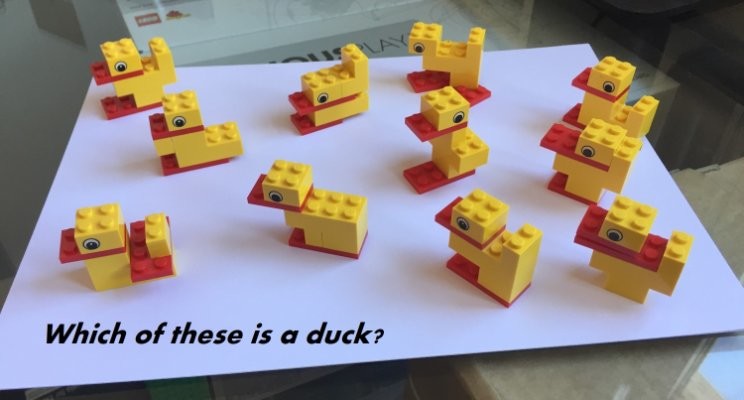
LSP and the fine line between culture and cult.
LSP, or LEGO Serious Play, is big business. There are books, workshops, websites and accreditation courses. Whilst there is part of me that admires LEGO’s marketing brilliance, securing a new adult niche for its colourful play blocks, the majority of me is overwhelmingly depressed by this latest corporate training fad. As far as I can gather, LSP workshops seem to basically entail getting a group of adults who work together to make stuff out of LEGO whilst talking about how they feel. You know, “You have 30 seconds to make a duck out of 6 blocks. Now, how do you feel about your duck?”. I have read stories of executive workshops in which participants are urged to construct abstract representations of corporate strategy or “the people you hate the most” in your company. I might pay good money for that last one, just to see the train wreck that ensued.
Articles written by suppliers of LSP extolling the virtues of LSP consistently protest “it is not a fad” (if it walks like a duck and talks like a duck….) and cite “neuroscience” and “academically robust ideas” without a lot of empirical data or concrete detail around these claims. How in reality does building a duck out of LEGO inform complex business problems that need to be solved in the real world by real teams? And who is going to be brave enough to call bullshit in an “Emperor’s New Clothes” environment that thinks it is a good investment to pull staff off line for half a day to play with toys and to uncover their feelings?
LEGO models act as metaphors for storytelling. More than just playing with bricks and hoping for inspiration, it’s a bit like play therapy – enabling people to express themselves through the medium of LEGO.” (unknown source)
This is a form of corporate gaslighting. Participation is not truly voluntary and employees must squash down uncomfortable feelings of being patronised, assessed (on their reaction and level of cooperation) and basically indoctrinated, to literally “play the game” and share politically correct versions of their constructions. The same concept holds for making people do things with play-dough in Agile training or making them wear coloured Six Thinking Hats. How does this improve employee wellbeing, engagement and performance?
Cults rely on behavior modification techniques of punishment and reward. In workplaces, not “playing the game” could result in punishment of job loss or restriction of opportunity. Reward means being perceived as a team player who is “on the bus”. We are operating in complex, chaotic environments which do not have simple solutions. Gamification and “funification” in the workplace have menacing underlying tones of manipulation and infantilism. These types of processes can be used to mask toxic corporate cultures that urge staff to have “fun” whilst disguising poor work conditions. People enjoy their jobs more when given the right conditions to work in, when they respect their manager and are enabled to use their strengths at work in their jobs. Engagement and wellbeing are fueled by real, genuine personal achievement and a sense of growth, not by simulated achievement constructing toys. An environment of psychological safety best promotes creativity and higher performance and these activities can feel unsafe for many.
If your company has spare cash to invest in manager training, can we not go back to basics, and train managers how to manage? How to talk to their people, genuinely listen, coach, provide feedback and model values? Or urge these managers to spend time on the front-line, seeing how staff actually have to work and asking how their work could be improved? I can only imagine the level of contempt that would be expressed by nurses, retail assistants, police, teachers, mechanics and plumbers witnessing highly paid corporate executives play with LEGO, describing it as an “innovative pedagogy of bricolage” (see quote below). Employees are looking for meaning as well as a wage from their job. But they are also looking for the same thing outside of work. When one begins to negate the need for the other, culture starts tipping in to cult.
LSP also links to the emerging innovative pedagogy of bricolage (creative tinkering with resources), that relates to “engaging in innovation by creative exploration of the practices and technologies needed to achieve an educational goal.” (Sharples et al., 2014).
It is time we stop drinking the Kool-Aid and got real about treating our people well and developing and managing them properly. Cults introduce bullshit. Cultures eliminate it. The cult-like rhetoric and practices that some companies use with their staff contrast painfully with the increasingly grim reality of being an employee in too many modern day organisations. Loyalty to an employer and pride in one’s work can be important for self-esteem, but the increasing merge of self and company is a cultural shift that poisonously favours the employer over the employee. Humanisation of work involves reinforcing the adult principles of dignity, respect, caring and autonomy in to jobs, not offering LEGO bricks and “fun” in return for longer hours with less resources.
Sam.

No Comments